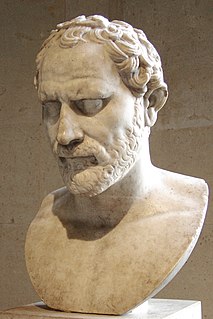A Quote by Seneca the Younger
Nemo tam divos habuit faventes,
Crastinum ut possit sibi polliceri.
Nobody has ever found the gods so much his friends that he can promise himself another day.
Related Quotes
How does it happen, Maecenas, that no one is content with that lot in life which he has chosen, or which chance has thrown in his way, but praises those who follow a different course?
[Lat., Qui fit, Maecenas, ut nemo quam sibi sortem,
Seu ratio dederit, seu fors objecerit, illa
Contentus vivat? laudet diversa sequentes.]
I don't know; I guess they'll never make another 'Nemo.' I see they're making another 'Monsters, Inc.' I had a wonderful idea for them. I swear to God, I think there could be a great sequel to 'Nemo' where the fish never will leave home. He just won't leave. 'Getting Rid of Nemo.' Right, 'You're 30 years old! Get out of here!'
More and more it seems to me that the philosopher, being of necessity a man of tomorrow and the day after tomorrow, has always found himself, and had to find himself, in contradiction to his today: his enemy was ever the ideal of today. So far all these extraordinary furtherers of men whom one calls philosophers, though they themselves have rarely felt like friends of wisdom but rather like disagreeable fools and dangerous question marks, have found their task, their hard, unwanted, inescapable task, but eventually also the greatness of their task, in being the bad conscience of their time.
Each individual composes the music of his own life. If he injures another, he brings disharmony. When his sphere is disturbed, he is disturbed himself, and there is a discord in the melody of his life. If he can quicken the feeling of another to joy or to gratitude, by that much he adds to his own life; he becomes himself by that much more alive. Whether conscious of it or not, his thought is affected for the better by the joy or gratitude of another, and his power and vitality increase thereby, and the music of his life grows more in harmony.
Long ago man formed an ideal conception of omnipotence and omniscience which he embodied in his gods. Whatever seemed unattainable to his desires - or forbidden to him - he attributed to these gods... Now he has himself approached very near to realizing this ideal, he has nearly become a god himself.
Sadly enough, my young friends, it is a characteristic of our age that if people want any gods at all, they want them to be gods who do not demand much, comfortable gods, smooth gods who not only don't rock the boat but don't even row it, gods who pat us on the head, make us giggle, then tell us to run along and pick marigolds.
The Lord gave the wonderful promise of the free use of His name with the Father in conjunction with doing His works. The disciple who lives only for Jesus' work and kingdom, for His will and honor, will be given the power to appropriate the promise. Anyone grasping the promise only when he wants something very special for himself will be disappointed, because he is making Jesus the servant of his own comfort. But whoever wants to pray the effective prayer of faith because he needs it for the work of the Master will learn it, because he has made himself the servant of his Lord's interests.








































